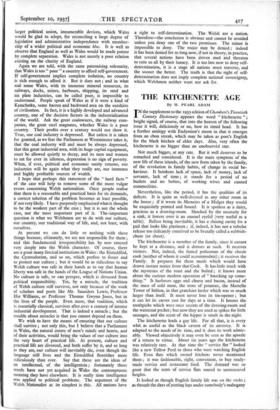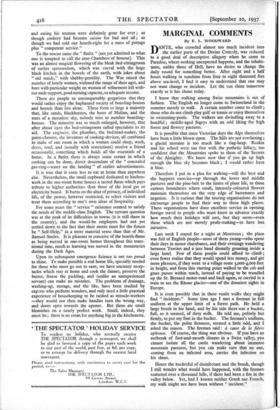THE KITCHENETTE AGE
By H. PEARL ADAM
I N the supplement to the 1933 edition of Chambers's Twentieth Century Dictionary appears the word " kitchenette " ; bright signal, of course, that into the heaven of the following issue it will, deliciously or no, bow its timid head. It has a further analogy with Endymion's moon in that it emerges from an ebon streak, which may be taken as poet's English for the black kitchen of elder days. Also, very often the kitchenette is no bigger than an unobserved star.
Not much bigger, at any rate. But it well deserves to be remarked and considered. It is the main symptom of the new life of these islands, of the new form taken by the family, of the revolution in family habits, of change in social be- haviour. It betokens lack of space, lack of money, lack of servants, lack of time ; it stands for a period of no butlers and no babies, of working wives and canned commodities.
Nevertheless, like the period, it has the qualities of its defects. It is quite as well-dressed as any other room in the house ; if it wrote its Memoirs of a Midget they would be exquisitely printed and bound. It is spotless as a dairy, gracious as a drawing-room. Shocked by the necessity for a sink, it lowers over it an enamel eyelid (very useful as a table). Refuse being inevitable, it has a shining cavity for a pail that looks like platinum ; if, indeed, it has not a tubular release too delicately contrived to be brutally called a rubbish- chute (or shoot).
The kitchenette is a member of the family, since it cannot be kept at a distance, and it dresses as such. It receives visitors. Not, indeed, the famed policeman of the classic cook (neither of whom it could accommodate) ; it receives the Family. It prepares for them meals which would have drawn instant notice from that Cook. It has little truck with the mysteries of the roast and the boiled ; it knows more about the curious modern operation of" knocking up some- thing." It harbours eggs and cheese and bacon, instead of the mass of cold meat, the store of potatoes, the Martell() Tower of Stilton, in that grandsire larder which was so much larger than itself. It must never lose its tin-opener ; but it can let its carver rest for days at a time. It houses the toothpicks which were once secrets of the dressing-room and the waistcoat pocket ; but now they are used as spikes for little sausages, and the scent of the kipper is smelt in the night.
The kitchenette leads a gay life. For all that, it is every whit as useful as the black cavern of its ancestry. It is adapted to the needs of its time, and it does its work admir- ably. Viewed objectively it may even be seen as the apostle of a return to virtue. About six years ago the kitchenette was relatively rare. At that time the " service flat " looked like a new Yellow Peril to those who were watching English life. Even flats which owned kitchens never mentioned them ; it was fashionable, right, convenient, to buy ready- made service and restaurant food. The demand was so great that the rents of service flats soared to wuneasured heights.
It looked as though English family life was on the rocks ; ZS though the days of putting legs under somebody's mahogany and eating his mutton were definitely gone for ever ; as though cookery had become cuisine for bad and all ; as though we had sold our hearth-right for a mess of pottage plus "competent service."
To the rescue came the " flatlet " (not yet admitted to what one is tempted to call the ante-Chambers of honour). This was an almost magical flowering of the bleak bed-sittingroom of earlier spinsterdom, which was coeval with the huge black kitchen in the bowels of the earth, with jokes about "old maids," with shabby-gentility. The War raised the number of lonely women, widened the range of their ages, and bore with particular weight on women of refinement left with- out male support, good earning capacity, or adequate income.
There are people so unconquerably gregarious that they would rather enjoy the haphazard society of boarding-houses and hostels than live alone. These form so large a majority that, like sands, blackberries, the hosts of Midian, and the stars of a moonless sky, nobody tries to number boarding- houses. The minority was so much enlarged, however, that after about 1920 the bed-sittingroom called specialists to its aid. The engineer, the plumber, the bedstead-maker, the paint-chemist, the inventors of cooking-devices, all combined to make of one room in which a woman could sleep, wash, dress, read, and (usually with restrictions) receive a friend occasionally, something which holds all the essentials of a home. In a flatlet there is always some corner in which cooking can be done, direct descendant of the "concealed gas-ring—water on the landing" of earlier advertisements.
It is true that it costs less to eat at home than anywhere else. Nevertheless, the small cupboard dedicated to kitchen- work in the one-room home houses a sacred flame which pays tribute to higher authorities than those of the local gas or electricity board. It burns on the altar of privacy, of individual life, of the power, however restricted, to select visitors and treat them according to one's own ideas of hospitality.
For some years the " service " existence seemed to satisfy the needs of the middle-class English. The servant question was at the peak of its difficulties in towns (it is still there in the country), and the would-he employers had not yet settled down to the fact that their motto must for the future be "Self-Help," in a more material sense than that of Mr. Samuel Smiles. It is pleasant to conceive of the hearth-flame as being nursed in one-room homes throughout this trans- itional time, much as learning was nursed in the monasteries during the Dark Ages.
Upon its subsequent emergence Science is not too proud to shine. To make possible a real home life, specially needed for those who must go out to earn, we have uncanny recep- tacles which stay at home and cook the dinner, preserve the butter, freeze the pudding, and (unlike an unexperienced servant) can make no mistakes. The problems of drainage, washing-up, storage, and the like, have been studied by experts who perform wonders, and only need a little practical experience of housekeeping to be ranked as miracle-workers —they would not then make handles turn the wrong way, and doors open towards the opener. But these are small blemishes on a nearly perfect work. Small, indeed, they must be ; there is no room for anything big in the kitchenette.











































 Previous page
Previous page